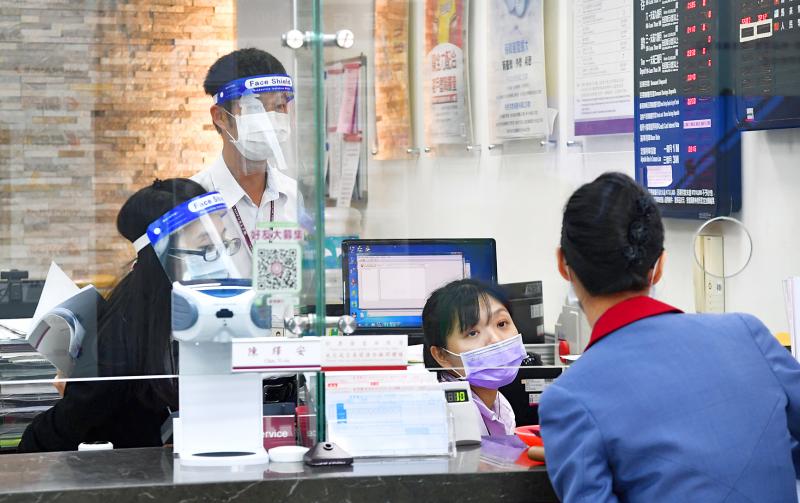Seventy-three percent of Taiwanese clients are dissatisfied with lending programs offered by their banks, a survey released on Thursday by the US-based data analytics company FICO found.
Local clients shared their discontent with others in the Asia-Pacific region, where on average 34 percent of people said that they were not offered any attractive lending incentives, 31 percent said they were not offered products superior to those they applied for and 28 percent said that banks failed to offer additional products to their liking, FICO said in a statement.
By contrast, 53 percent of Taiwanese clients said that they reacted positively when banks personalized offers, as they felt the banks had taken their circumstances into account, FICO said.

Photo: CNA
One in five Taiwanese said they were “very willing” to offer more financial information in return for better pricing, the results showed.
Fifty-seven percent of Taiwanese expected to obtain the loan money within a week, while 21 percent anticipated obtaining it in one day and 19 percent within one hour, FICO said.
Real-time transactional experiences on other trading platforms have led clients to expect similar engagement from lenders, it added.
Overall, respondents were not impressed with banks that appeared not to know clients’ needs, FICO senior director of decision management solutions in the Asia-Pacific Aashish Sharma said in the statement.
Many banks in Taiwan do not have a comprehensive pricing strategy that aligns with their overall business strategy, he added.
“Clients are used to innovative pricing strategies from airlines, ride-sharing services and insurance companies, but banks are lagging behind,” Sharma said.
Social media companies have worked out how to put ads in front of targeted viewers, which brought them increased engagement and uptake, he said, adding that banks could learn to do the same.
While banks should move beyond single-product pricing to cross-selling, some lack the motivation, because it is inconvenient for people to switch banks, but that might not be the case in the next three years, as competition is increasing and regulation is demanding open banking, Sharma said.

Taiwan Transport and Storage Corp (TTS, 台灣通運倉儲) yesterday unveiled its first electric tractor unit — manufactured by Volvo Trucks — in a ceremony in Taipei, and said the unit would soon be used to transport cement produced by Taiwan Cement Corp (TCC, 台灣水泥). Both TTS and TCC belong to TCC International Holdings Ltd (台泥國際集團). With the electric tractor unit, the Taipei-based cement firm would become the first in Taiwan to use electric vehicles to transport construction materials. TTS chairman Koo Kung-yi (辜公怡), Volvo Trucks vice president of sales and marketing Johan Selven, TCC president Roman Cheng (程耀輝) and Taikoo Motors Group

Among the rows of vibrators, rubber torsos and leather harnesses at a Chinese sex toys exhibition in Shanghai this weekend, the beginnings of an artificial intelligence (AI)-driven shift in the industry quietly pulsed. China manufactures about 70 percent of the world’s sex toys, most of it the “hardware” on display at the fair — whether that be technicolor tentacled dildos or hyper-realistic personalized silicone dolls. Yet smart toys have been rising in popularity for some time. Many major European and US brands already offer tech-enhanced products that can enable long-distance love, monitor well-being and even bring people one step closer to

RECORD-BREAKING: TSMC’s net profit last quarter beat market expectations by expanding 8.9% and it was the best first-quarter profit in the chipmaker’s history Taiwan Semiconductor Manufacturing Co (TSMC, 台積電), which counts Nvidia Corp as a key customer, yesterday said that artificial intelligence (AI) server chip revenue is set to more than double this year from last year amid rising demand. The chipmaker expects the growth momentum to continue in the next five years with an annual compound growth rate of 50 percent, TSMC chief executive officer C.C. Wei (魏哲家) told investors yesterday. By 2028, AI chips’ contribution to revenue would climb to about 20 percent from a percentage in the low teens, Wei said. “Almost all the AI innovators are working with TSMC to address the

Malaysia’s leader yesterday announced plans to build a massive semiconductor design park, aiming to boost the Southeast Asian nation’s role in the global chip industry. A prominent player in the semiconductor industry for decades, Malaysia accounts for an estimated 13 percent of global back-end manufacturing, according to German tech giant Bosch. Now it wants to go beyond production and emerge as a chip design powerhouse too, Malaysian Prime Minister Anwar Ibrahim said. “I am pleased to announce the largest IC (integrated circuit) Design Park in Southeast Asia, that will house world-class anchor tenants and collaborate with global companies such as Arm [Holdings PLC],”